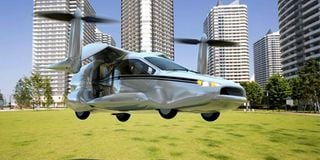Premium
You could be flying a car around Nairobi by 2025

TF-X™ is the practical realisation of the dream of countless visions of the future. Kenya Airways has partnered with the Embraer spinoff Eve to develop operational models for urban air mobility (UAM) through its new fully fledged subsidiary Fahari Aviation.
What you need to know:
- Kenya Airways believes it could fly into a prosperous future with its electric vertical take-off and landing (eVTOL) aircraft.
- More than 50 firms are now developing prototypes of personal air transportation for up to eight passengers.
Forget the double-decker expressway that promises to eliminate traffic in Nairobi... you could as soon as 2025 be able to hover over traffic in a Kenya Airways flying taxi.
Yes, Kenya Airways, the prized national carrier that is today surviving on government bailouts, and which has been reporting multi-billion-shilling losses, believes it could fly into a prosperous future with its electric vertical take-off and landing (eVTOL) aircraft.
KQ has partnered with the Embraer spinoff Eve to develop operational models for urban air mobility (UAM) through its new fully fledged subsidiary Fahari Aviation. Under the agreement, Eve, which is developing a fully electric air taxi for urban transport missions, will work with Fahari to establish its Urban Air Mobility (UAM) network and the required urban air traffic management procedures as well as operating environment.
Fahari will support Eve’s aircraft and product development process, which will help guide the integration of UAM with Kenya Airways’ overall operations.
“We are working on a future, 2025 onwards, to see how we can support urban mobility using electric vertical take-off and landing. We are exploring ways to see how that is going to work [together with] Fahari Aviation,” Kenya Airways CEO Allan Kilavuka said.
In 2019, the Nairobi Metropolitan Area Transport Authority ranked Nairobi as the world’s fourth most congested city, with residents taking an average of 57 minutes in travel time.
The report indicated that city dwellers lost about Sh100 billion while stuck in traffic jams, missing meetings and using up time dedicated for productivity in daylong gridlocks. In some city commutes, motorists spend as much as two hours to get to work and back, or four hours daily in traffic.
Finding a solution for this nightmare has made and broken political careers as authorities promise double-decker roads, expansion of existing road networks, bus rapid transport and even trams.
The solution could, however, come from private sector players, who believe they are well on course to fast-track the production of lightweight and high-quality aircraft over the next three to five years.
Several prototypes
Many eVTOL concepts are being mobilised for urban taxi services, parcel delivery, medical assistance and recreation, with minimal military use.
Around the world, over 50 companies are developing several prototypes of personal air transportation for up to eight passengers that can set off and land from predefined locations.
Companies like Kenya Airways, Uber, Embraer, American Airlines, Virgin Atlantic and aircraft lessor Avalon Holdings are racing to be ahead of the curve to roll out flying taxis as the next frontier of urban transport.
Kenya Airways partner, Eve Urban Air Mobility Solutions, has signed contracts with 17 companies for 1,735 orders of Eve eVTOLs, valued at $5 billion, as of January 2022.
KQ said that, with this partnership, the firm is hoping to develop innovative air mobility solutions for clients in Kenya and throughout the region.
Kenya Airways, which reported a net loss in the financial year to December 2020 of Sh36.2 billion — the highest ever in its history — said it expects to make a recovery by 2024.
Cost-cutting mission
The carrier has been on a cost-cutting mission to restructure its operations while cementing growth in cargo and chartered passenger services to bring in additional revenue.
But now the company sees a future growth in auxiliary services to net more revenue and has set up the new subsidiary to spearhead opportunities offered by new technologies.
Fahari Aviation, the fully fledged and fully owned subsidiary of Kenya Airways, will focus on the future of aviation. The new entity is already offering drone pilots a month-long course to obtain a Remote Pilot License at a cost of Sh180,000.
“So everything around drones, and everything that is new technology, is housed in Fahari and the firm has been training drone pilots. We are also undertaking drone operations, including surveillance, security and agricultural support such as spraying,” Mr Kilavuka said.
He said the airline has a fully fledged innovation centre where the firm works with small enterprises — innovators who are collaborating to find opportunities and new ways of doing things.





